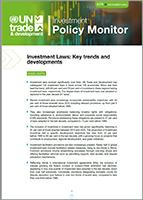
Investment Policy Monitor, Issue No 29
Investment laws are a cornerstone of national investment frameworks, particularly in relation to foreign direct investment (FDI) across many economies.
Drawing on a review of 132 investment laws included in the UN Trade and Development (UNCTAD) Investment Laws Navigator, this Investment Policy Monitor identifies key trends in their evolution. It compares the content of these laws across four adoption periods: pre-1995, 1995-2004, 2005-2014, and 2015-2024.
The analysis focuses on selected provisions that have undergone the most significant changes over time, including the sustainability dimension, investment incentives, investment facilitation and dispute settlement mechanisms.
Key findings
- Investment laws have evolved significantly over time. UN Trade and Development has catalogued 132 investment laws in force across 130 economies. Africa and Asia lead the trend, with 93% and 79% of countries in these regions having investment laws, respectively. The largest share of investment laws (47) was adopted or replaced in the past decade.
- Recent investment laws increasingly incorporate sustainability objectives. Since 2015, 40% of investment laws include relevant sustainability provisions, up from just 5% of those adopted before 1995.
- They also increasingly emphasize balancing investor rights with obligations, including adherence to environmental, labour and corporate social responsibility (CSR) standards. Provisions addressing these obligations are present in 57% of laws adopted in the last decade, compared to 14% before 1995.
- The inclusion of incentives in investment laws has grown significantly. Incentives are featured in 81% of laws enacted between 2015 and 2024. The share of investment incentives tied to specific development objectives has risen from 44% before 1995 to 60% in the last decade, with a growing focus on projects that contribute to employment, regional development and green initiatives.
- Investment facilitation provisions are also increasingly present. Nearly half of global investment laws include facilitation-related measures, rising to two-thirds in Africa. Common provisions involve streamlining processes through one-stop shops and offering facilitation services such as permitting support, land access and dispute prevention mechanisms.
- The inclusion of clauses granting the State’s consent to investor-State arbitration has declined, reflecting trends in international investment agreements. Such clauses appear in only one quarter of investment laws adopted in the last decade, down from over half previously. Conversely, provisions designating domestic courts for dispute resolution now feature in over two thirds of recent laws, compared to less than one third before 1995.
Investment laws: Key trends and developments - Investment Policy Monitor, Issue No 29 (UNCTAD/DIAE/PCB/INF/2024/7)
17 Dec 2024


